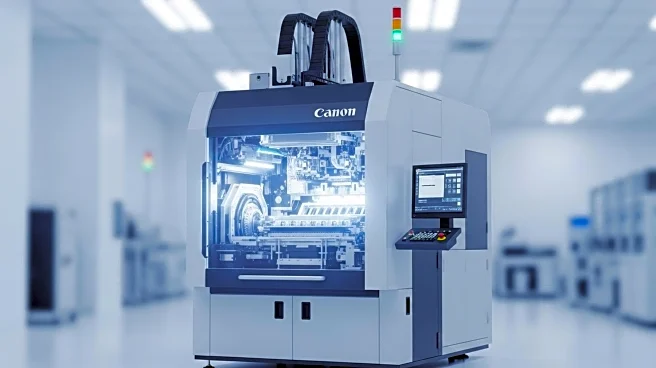What's Happening?
US lawmakers are pushing for broader bans on the sale of chipmaking equipment to China following a bipartisan investigation. The investigation revealed that Chinese chipmakers purchased $38 billion worth of advanced machinery last year, despite existing export restrictions. The report from the US House of Representatives Select Committee on China highlights inconsistencies in rules between the US, Japan, and the Netherlands, allowing non-US manufacturers to sell equipment to Chinese firms. The committee recommends expanding bans to cover all chipmaking tool sales to China, rather than targeting specific companies. This move is part of ongoing efforts by both Democratic and Republican administrations to limit China's ability to produce microchips, which are crucial for artificial intelligence and military modernization.
Why It's Important?
The call for broader bans on chipmaking tool sales to China reflects growing concerns over China's technological advancements and their implications for global security and economic competition. Restricting China's access to advanced chipmaking tools is seen as a strategic move to maintain US technological superiority and protect national security interests. The semiconductor industry is vital for various sectors, including defense and artificial intelligence, making control over chip production a critical geopolitical issue. The proposed bans could impact US-China relations and influence global supply chains, affecting industries reliant on semiconductor technology.
What's Next?
The committee's recommendations may lead to new regulations and increased coordination between the US and its allies to enforce broader bans on chipmaking tool sales to China. This could result in tighter restrictions on components that China could use to develop its own chipmaking capabilities. The industry may experience shifts in sales patterns, with companies adjusting to comply with new regulations. The ongoing geopolitical tensions between the US and China are likely to influence future policy decisions regarding technology exports.
Beyond the Headlines
The push for expanded bans on chipmaking tools highlights the broader geopolitical struggle between the US and China over technological dominance. This situation raises ethical questions about the balance between free trade and national security. The implications for human rights and democratic values are significant, as control over technology can influence global power dynamics and societal norms.









